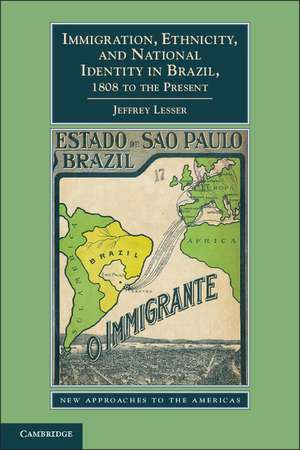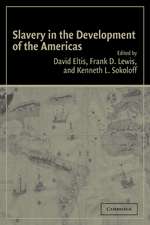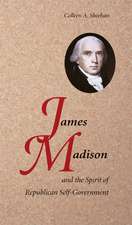Immigration, Ethnicity, and National Identity in Brazil, 1808 to the Present: New Approaches to the Americas
Autor Jeffrey Lesseren Limba Engleză Paperback – 20 ian 2013
| Toate formatele și edițiile | Preț | Express |
|---|---|---|
| Paperback (1) | 201.59 lei 6-8 săpt. | |
| Cambridge University Press – 20 ian 2013 | 201.59 lei 6-8 săpt. | |
| Hardback (1) | 400.18 lei 6-8 săpt. | |
| Cambridge University Press – 20 ian 2013 | 400.18 lei 6-8 săpt. |
Preț: 201.59 lei
Nou
Puncte Express: 302
Preț estimativ în valută:
38.58€ • 41.25$ • 32.16£
38.58€ • 41.25$ • 32.16£
Carte tipărită la comandă
Livrare economică 17 aprilie-01 mai
Preluare comenzi: 021 569.72.76
Specificații
ISBN-13: 9780521145350
ISBN-10: 052114535X
Pagini: 224
Ilustrații: 19 b/w illus. 1 map 19 tables
Dimensiuni: 152 x 229 x 18 mm
Greutate: 0.32 kg
Ediția:New.
Editura: Cambridge University Press
Colecția Cambridge University Press
Seria New Approaches to the Americas
Locul publicării:New York, United States
ISBN-10: 052114535X
Pagini: 224
Ilustrații: 19 b/w illus. 1 map 19 tables
Dimensiuni: 152 x 229 x 18 mm
Greutate: 0.32 kg
Ediția:New.
Editura: Cambridge University Press
Colecția Cambridge University Press
Seria New Approaches to the Americas
Locul publicării:New York, United States
Cuprins
1. Creating Brazilians; 2. From Central Europe and Asia: immigration schemes, 1822–70; 3. Mass migrations, 1880–1920; 4. The creation of Euro-Brazilian identities; 5. How Arabs became Jews, 1880–1940; 6. Asianizing Brazil: new immigrants and new identities, 1900–55; 7. Epilogue: the song remains the same.
Recenzii
'A crowning achievement by the premier historian of immigration to Brazil. In this highly readable book, Lesser shows how immigrants from Europe, Asia, and the Middle East helped create new ways of being white, of being nonwhite, and of being Brazilian, and in so doing, helped create modern Brazil.' George Reid Andrews, University of Pittsburgh
'Jeff Lesser is on intimate terms with Brazilian history and is an authoritative guide to this topic. His new overview of immigration to Brazil will richly reward its readership. [He] studies immigration as a process, not simply an event. [He] concentrates on the immigrants' interactions with the state and their participation in larger social and political currents. This is better than the older approach that tends to isolate immigrants (usually a single ethnic group) in the mind's eye, focusing on what they did not share with non-immigrants. In sum, Lesser shows us that to pull immigrants out of Brazil's living collage is to misunderstand them and their experience. Highly recommended!' John Charles Chasteen, University of North Carolina
This fascinating and lively book teaches us that to understand ethnicity and immigration we must consider Brazil, and to understand Brazil we must consider immigration and ethnicity.' Jerry Dávila, University of Illinois
'Jeffrey Lesser masterfully surveys the history of immigration to Brazil (and to some extent, from Brazil) through the lens of ethnicity. He has digested a vast literature in English and Portuguese to produce a concise and well-crafted volume that will become the standard survey of the subject.' Marshall C. Eakin, Vanderbilt University
'In this engaging and provocative book, historian Jeffrey Lesser demonstrates how central immigration has been, and continues to be, in struggles over Brazilian national identity. Weaving together his prodigious knowledge of postcolonial Brazilian history and the diverse experiences of the many immigrant ethnic groups in Brazil, Lesser produces a portrait of Brazilian society since independence that challenges and revises both scholarly and popular notions of what it means to be Brazilian.' Barbara Weinstein, New York University
'This book is accessible enough for the general reader, though the best use will be in an undergraduate course on Brazilian history or a course on race and ethnicity in Brazil or Latin America more broadly.' Colonial Latin American Historical Review
'Jeff Lesser is on intimate terms with Brazilian history and is an authoritative guide to this topic. His new overview of immigration to Brazil will richly reward its readership. [He] studies immigration as a process, not simply an event. [He] concentrates on the immigrants' interactions with the state and their participation in larger social and political currents. This is better than the older approach that tends to isolate immigrants (usually a single ethnic group) in the mind's eye, focusing on what they did not share with non-immigrants. In sum, Lesser shows us that to pull immigrants out of Brazil's living collage is to misunderstand them and their experience. Highly recommended!' John Charles Chasteen, University of North Carolina
This fascinating and lively book teaches us that to understand ethnicity and immigration we must consider Brazil, and to understand Brazil we must consider immigration and ethnicity.' Jerry Dávila, University of Illinois
'Jeffrey Lesser masterfully surveys the history of immigration to Brazil (and to some extent, from Brazil) through the lens of ethnicity. He has digested a vast literature in English and Portuguese to produce a concise and well-crafted volume that will become the standard survey of the subject.' Marshall C. Eakin, Vanderbilt University
'In this engaging and provocative book, historian Jeffrey Lesser demonstrates how central immigration has been, and continues to be, in struggles over Brazilian national identity. Weaving together his prodigious knowledge of postcolonial Brazilian history and the diverse experiences of the many immigrant ethnic groups in Brazil, Lesser produces a portrait of Brazilian society since independence that challenges and revises both scholarly and popular notions of what it means to be Brazilian.' Barbara Weinstein, New York University
'This book is accessible enough for the general reader, though the best use will be in an undergraduate course on Brazilian history or a course on race and ethnicity in Brazil or Latin America more broadly.' Colonial Latin American Historical Review
Notă biografică
Descriere
This book examines the immigration to Brazil of millions of Europeans, Asians and Middle Easterners beginning in the nineteenth century.

































